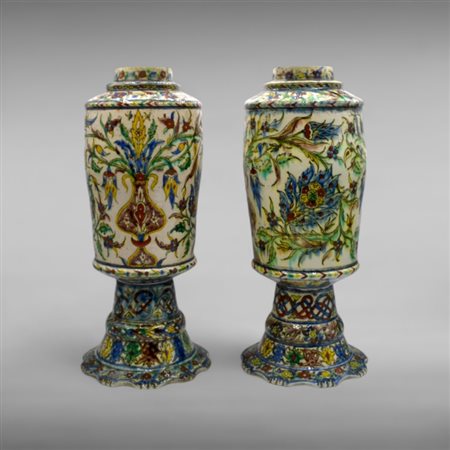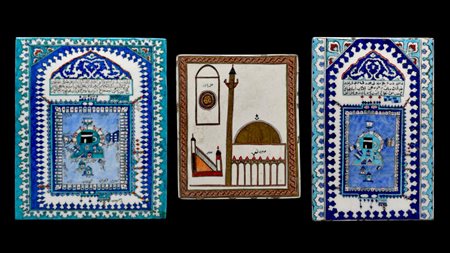Islamic and Indian art from a Private Collection in Rome and other provenances. In partnership with BAIAS Arte.
-

Lotto 1 Pair of Kutahya stem vases
Ottoman Turkey, 18th century
of glazed siliceous body, resting on a truncated cone base with a polylobed everted foot on which rest two almost cylindrical, urn-shaped containers. The exterior is densely decorated with flower vases and sprays in shades of yellow, green, red, blue and aubergine purple. Minor damage and missing part at one foot.
H 34 X l.14 cm -

Lotto 2 A high footed Kutahya pottery cup
Ottoman Turkey, 18th century
Resting on a circular domed foot, tubular stem and finial cup. The exterior painted in the classic style of the manufacture with repeated naive floral elements in shades of yellow, green red and blue. Central handle with moulded protruding rhombuses decorated with fish scale motif. Mark of manufacture (endless knot flanked by double C) painted in blue on the inside of the base. Minor wears.
H.24 X L.12.2 cm -

Lotto 3 Two European Iznik-style vases
Belgium, Boch Frères Keramis manufacture, second half of the 19th - early 20th century
glazed ceramic, hexagonal section with domed top. The exterior decorated in Iznik style with saz leaves, hatayi, carnations and tulips. Mark of manufacture at the base.
H.42 X L.21 cm -

Lotto 4 A Kutahya tile panel
Turkey, 20th century
Large decorative glazed ceramic tile panel decorated in typical Ottoman style with a central lobed niche containing hatayi and twirling saz leaves around a central medallion with two pendants in turn decorated with a bands of cloud on a turquoise background. The latter decoration is replicated in the corners, complemented by a border of repeated palmettes. The composition is reminiscent of manuscript bindings.
123x62 cm -

Lotto 5 Fragment of an IznikOttoman
Turkey, Iznik, second half 16th century
Lower portion of a glazed ceramic tankard decorated in the four-flower style with underglaze blue and emerald green and the bright red Armenian bole overglaze.
Damages.
11,4 cm x 13,5 cm -

Lotto 6 Iznik dish Ottoman
Turkey, late 16th century
Siliceous body, painted symmetrically with carnations and plants in the two hemispheres created by the saz leaf in the centre. Ottoman reinterpretation of the Chinese rock and wave motif on the brim.
D. 26 cm -

Lotto 7 Pair of Samson Iznik-style vases
France, second half 19th century
Glazed pottery, standing on a disc, globular body and high flared neck. The exterior decorated in the typical Iznik style with saz leaves, hatayi and carnations in shades of green, red and blue. One of the two vases bears the mark of Samson manufature.Samson was among the European manufactures most active in reproducing Iznik ceramics, whose designs dating back to the 16th century, as in the case of these vases, had refined the tastes of Western amateurs who could appreciate them treasured in museums of applied art.
H. 33 cm -

Lotto 8 Pair of European pottery vases in the Iznik style
Probably France, second half 19th century
Glazed ceramic, resting on disc, globular body and high flared neck; double zoomorphic handle. The exterior decorated in the typical Iznik style with red bole carnation plants and blue leaves. Spiral motif, commonly found on the brim or back of Iznik originals, repeated on the foot.
H cm 3O -

Lotto 9 A Kutahya tile panel signed by Mohammad 'Abin
Ottoman Turkey, 18th century
Large panel composed of ten glazed ceramic tiles decorated with a central poly-lobed niche containing a hanging lamp transformed into a vase of flowers. The central field surrounded by split palmettes whose volutes contain multicoloured carnations. Border decorated with repeated hamse. The composition boasts the colours typical of Kutahya's best period of production: yellow, aubergine, green, light blue and blue.The colophon inscription at the bottom reads: Made by Muhammad ¿Abin, one of Mohammad ¿Ali's students in Ottoman Kutahya. Minor damages.
99.5 X 59.5 cm -

Lotto 10 Group of 15 pottery tile fragments
Iran, Turkey and Spain, 16th-19th century
Includes: a substantial group of Iznik border tiles, fragments of Persian tiles with arabesques, and a fragment of Hispano-Moorish cuenca tiles.
L. 20 cm (the largest) -

Lotto 11 Pair of Cuenca tiles
Spain, 16th century
Composition of two tiles forming an eight-pointed star in shades of green and ochre.
Defects.
30x12 cm -

Lotto 12 A large Aresta (cuenca) tile panel
Spain, probably Seville, 16th century
Consisting of 16 ceramic tiles within an iron frame. Four central azulejos bordered by tiles in shades of green, ochre and light blue in the cuenca technique, which provides a concave housing for the colour, thus preventing it from mixing during firing.
H. 100 X 100 cm (25 X 25 cm ciascuna mattonella) -

Lotto 13 Iznik pottery jug
Ottoman Turkey, 17th century
Made of siliceous body decorated in the Kara Memi style with tulips, carnations and plum blossom under a transparent glaze.
Restorations.
H. 23 X L. 16 cm -

Lotto 14 A large Iznik style pottery bowl
Europe, 19th century
Made of glazed ceramic, painted in the 'four flowers' style with a fantasy plant with hyacinths, tulips, carnations and a central saz leaf. Decorative band with rock and wave motif on the rim and floral decoration also on the outside.
H. 17.5 X D.35 cm -

Lotto 15 Iznik Dish Ottoman
Turkey, Iznik, 17th century
Siliceous paste body, painted in the Kara Memi style with flowers in shades of blue, green and red within a black outline. Small multicoloured spirals on the outside of the cavetto.
Significant damage.
H. 6.5 X D.30 cm -

Lotto 16 Group of three tiles depicting Ka'ba and Medina
Turkey, 20th century
Two Iznik style tiles depicting the sacred precincts of Mecca surmounted by a long religious inscription in naskh and a lobed reserve containing half palmettes. Border of repeated hamse. The third tile painted with the mosque and pulpit (minbar) of the prophet.
33 X 27 cm the largest -

Lotto 17 A group of Iznik-style tiles
Turkey, 20th century
Decorative glazed pottery tile decorated with a central lobed medallion containing a bands of clouds on a blue background, framed by four turquoise saz leaves and branches of plum blossom.
20 x 20 cm (ciascuna mattonella) -

Lotto 18 Large pottery window frame Qajar
Persia, 19th century
Large, siliceous paste panel composed of 10 tiles, the two horizontal ones forming the window frame and a lintel. The decoration is figurative and includes several characters on a cobalt blue background depicting courtly scenes, a theme related to the Princely cycle. Each character is named in the reserve inscribed above its head, being them the legendary kings narrated in the Shahnameh. The historiated decoration is flanked by a thinner border containing plant elements against a green background.
Visible lackings, otherwise in good condition.
H. 154 X L.105.5 X P. 3 cm -

Lotto 19 Two tombak items and a brass teapot
Ottoman Turkey, late 18th - 20th century
Includes: a container with hinged lid made of embossed copper with plant motifs; a gilded copper plate engraved with a flower surrounded by plant volutes and a cast brass teapot decorated with vegetal motifs.
D. 15 cm -

Lotto 20 Basin with pouring spout. Signed in Hebrew.
Mamluk domains, late 15th century
Circular section and truncated cone shape, in tinned copper decorated with a band containing half palmettes within rectangular cartouches alternating with medallions with a Y motif.
Hebrew signature (Heim) under the upper rim.
D. 31.8 X h. 14 cm
-

Lotto 21 A silver embossed Ottoman hammam bowl
Balkans, 19th century
with a characteristic shape with a central protruding umbo, decorated with lattice of petals placed in radial arrangement around a central flower.
D. 19 cm -

Lotto 22 A silver embossed Ottoman hammam bowl
Balkans, late 18th century
with a characteristic shape with a central umbo, decorated in Baroque style with a central flower surrounded by petals containing a plant-like floral element. The wall decorated with reverse embossed plants from the inside outwards.
D. 24 cm -

Lotto 23 A Seljuk bronze Khorasan Dish
Eastern Persia, 12th century
Circular section with straight sides and everted rim, of bronze engraved with central roundel containing rosettes with birds and half-palmettes inlaid with silver and copper wires. Fine epigraphic band in kufic on the rim, arranged within cartouches separated by medallions with birds. The reverse decorated with engraved harpy. Auspicious inscription addressed to the owner of the dish: bi'l-yumn al-sa'ada wa al-'afiya wa [...]li-sahibih.
Provenance: Christie's London, 6 October 2011, Collection d'une amateur belge, no. 28;Exhibited at the Institute du Monde Arabe, Paris, until 2023 Artcurial, Antiquiteis & Islamic Art, 24 May 2023, Lot 121.
D. 17.8 cm -

Lotto 24 A Mughal style bone inscribed box
India, 19th century
Of camel bone, rectangular, with hinged lid. The exterior carved with broad religious inscriptions in Arabic carved in thuluth calligraphy and arranged within cartouches bordered by stylised plant elements.
19.3 x 11.5 x 13.4 cm
